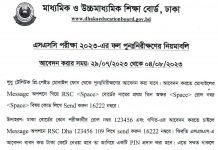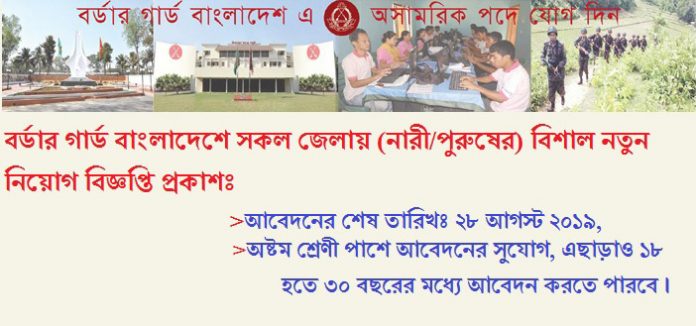Border Guard Bangladesh (BGB) publishes Civilian Jobs for Bangladeshi citizens. There are 16 positions and 88 posts. BGB offers new jobs for people. Application deadline: 28 Aug 2019. BGB Job circular Website http://www.bgb.gov.bd/
BGB civil Post Jobs circular-



Role: Border Guard Bangladesh (BGB) is a well-organized paramilitary force honoring heroism and heritage. The BGB has been carrying out the task of ‘insider guard’ to maintain internal peace and order, including border security, prevention of smuggling, women and children and drug trafficking in Bangladesh. After the establishment of the 223-year long route, the present duty of the army has increased greatly and the efficiency has increased. The evolution of the BGB in the course of history is as follows:
A. Ramgarh Local Battalion: The name of the ‘Frontier Protection Force’ formed by the East India Company was changed to the name of ‘Ramgarh Local Battalion’ on 23 June. During its inception, its operation began with two irregular equestrian teams and four cannons of four members.
B. Frontier Guards: This force was reorganized in the name of ‘Frontier Guards’ in the 1861st with regular and irregular members of the Eastern Police Force. At that time, its headquarters were located in Chittagong and the sub-border borders were located in Kamrup, Golpara, Lakshpur, Sylhet, and Tripura. In 1454, the army named the Special Reserve Company established the first base at Peelkhana.
C. Bengal Military Police: In 1891, the army was renamed as ‘Bengal Military Police’. At that time, four companies of the battalion, led by a European subedar, were set up in different parts of the Indian subcontinent, Dhaka, Dhumka, Bhagalpur and Gangot.
D. Eastern Frontier Rifles: The Eastern Frontier Rifles was renamed in 1920 with 16 platoons, increasing its manpower and strength. Its primary function then was to protect the border and assist in internal security.
E. East Pakistan Rifles: After the division of India in the 1947th, the reconstituted army was renamed the EPR (East Pakistan Rifles). A team of Kolkata Metropolitan Armed Police, some Bengali and a thousand ex-soldiers of West Pakistan at that time joined the army. Later, the army was organized by employing another three thousand Bengalis. Officers were appointed from the military to require efficient leadership and guidance. In 1958, the army was given the responsibility of controlling smuggling. By 25th March 1971, the force of the force had increased to 1,3454.
F. Active participation of the forces in the liberation war: The army has played an unforgettable role in the great liberation war of Bangladesh. On the night of 25 March 1971, the invading forces attacked the then EPR headquarters at Pilkhan, Dhaka. The message of independence of Bangabandhu from the army headquarters was delivered to the remote areas of the country with the addition of wireless. As a result, the soldiers and people of this country got involved in armed struggle against the Pak invaders. Initially, the Bengali members of the EPR developed resistance in Jinjira on the other bank of the Buriganga River for strategic reasons.
Later, 12,000 Bengali soldiers of the army were organized along with other forces and emancipated people for 9 months in 11 sectors of Bangladesh. The freedom fighters of the army conducted numerous vicious operations, including frontal warfare against guerrillas, guerrilla warfare and suicide attacks to wipe out enemy hostilities. During the War of Liberation, a total of 817 soldiers were martyred. Among them, martyr Lance Naik Noor Mohammad Sheikh and martyr Lance Naik Munshi Abdur Rauf were awarded the highest military title ‘Bir Shrestha’ for their immense valor. In addition, 8 were given the title of ‘Bir Uttam’, 32 ‘Bir Vikram’ and 78 ‘Bir Pratik’.
G. Bangladesh Rifles: The BDR (Bangladesh Rifles) was renamed on 3 March 1972 after the independence of the country. On 3 March 1980, the national flag was given by the government of Bangladesh as a special recognition of the activities of this force. Bangladesh Rifles was awarded the Independence Award in recognition of its unforgettable contribution to freedom and liberation war in 2008.
H. Border Guard Bangladesh: In the brutal killings that took place at Peelkhana on 25-26 February 2009, 57 soldiers were killed, including 74 army personnel. After the tragic incident, the army needs to be restructured. The Border Guard Bangladesh Act 2010, 20 December was passed in the Great Parliament on 8 December 2010, and it came into effect from 25 December. Hon’ble Prime Minister Sheikh Hasina officially launched the new army march on 23 January 2011, with the unveiling of a new flag of ‘Border Guard Bangladesh’ (BGB) and the unveiling of a monogram at the army headquarters.
Conclusion: Under the new law, the organizational restructuring of the force is under implementation. The force is currently carrying out the duties assigned to it through 16 sectors, 16 battalions and a number of BOPs. The BGB has been working as a “vigilant guard of the border” to prevent any kind of border crime, including border security, smuggling, women and children and drug trafficking, as well as internal peace and order.
BGB job circular 2019 pdf, bgb job circular 94 batch, bgb job circular 93 batch, bgb job circular 94 batch 2019, bangladesh bgb job circular 2019, bangladesh bgb job circular 2019, bgb circular 2019,, bgb job circular 2019 94 batch, http://www.bgb.gov.bd/.
BGD job circular 2019 pdf, Bangladesh bgb circular 2019, bgb job circular 94 batch 2019, www.bgb.gov.bd job circular 2019, bgb circular 2019 94 batch, bgb job circular 93 batch, www.bgb.gov.bd circular 2019, www Bangladesh bgb circular 2019, border guard Bangladesh (bgb) civil job circular 2019.



















